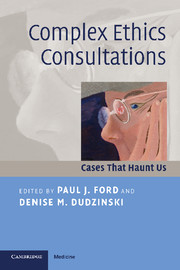Book contents
- Frontmatter
- Contents
- List of contributors
- Foreword
- Acknowledgments
- Introduction: Live and learn: courage, honesty, and vulnerability
- Part I Starting at the beginning: prenatal and neonatal issues
- 1 Quality of life – and of ethics consultation – in the NICU
- 2 When a baby dies in pain
- 3 But how can we choose?
- 4 Maternal–fetal surgery and the “profoundest question in ethics”
- Part II The most vulnerable of us: pediatrics
- Part III Diversity of desires and limits of liberty: psychiatric and psychological issues
- Part IV Withholding therapy with a twist
- Part V The unspeakable/unassailable: religious and cultural beliefs
- Part VI Human guinea pigs and miracles: clinical innovations and unorthodox treatment
- Part VII The big picture: organizational issues
- Conclusions, educational activities, and references
- Index
1 - Quality of life – and of ethics consultation – in the NICU
Published online by Cambridge University Press: 03 May 2010
- Frontmatter
- Contents
- List of contributors
- Foreword
- Acknowledgments
- Introduction: Live and learn: courage, honesty, and vulnerability
- Part I Starting at the beginning: prenatal and neonatal issues
- 1 Quality of life – and of ethics consultation – in the NICU
- 2 When a baby dies in pain
- 3 But how can we choose?
- 4 Maternal–fetal surgery and the “profoundest question in ethics”
- Part II The most vulnerable of us: pediatrics
- Part III Diversity of desires and limits of liberty: psychiatric and psychological issues
- Part IV Withholding therapy with a twist
- Part V The unspeakable/unassailable: religious and cultural beliefs
- Part VI Human guinea pigs and miracles: clinical innovations and unorthodox treatment
- Part VII The big picture: organizational issues
- Conclusions, educational activities, and references
- Index
Summary
Case narrative
One Sunday afternoon, the on-call ethicist (one of the co-authors) received a consultation request from the Neonatal Intensive Care Unit (NICU) of our 500-bed academic medical center. Two weeks earlier, a baby had been born at term with skeletal, renal, cardiac, and (most profoundly) pulmonary abnormalities but no known neurologic defects. The baby had been intubated in the delivery room and subsequently developed pulmonary hypertension, requiring high ventilator settings and inspired oxygen concentration and necessitating that the patient be chemically paralyzed.
Because the patient's abnormalities were not consistent with any defined syndrome, his long-term prognosis remained unclear – the neonatology team covering on the weekend described it as “quite bleak.” It was possible that the patient could become permanently ventilator-dependent, although it was also possible that he would eventually breathe on his own, albeit still with limb deformities and renal problems. The only certainty at that time was that the patient would require weeks to months of ventilatory support to survive.
Two days earlier, the NICU team had met with the family, and the decision was made to de-escalate the patient's level of life support by withdrawing chemical paralysis and making the patient DNR (do not resuscitate). Although mechanical ventilation was continued, most people involved in the case (including the patient's parents) did not expect the baby to survive. However, to everyone's surprise, over the next 48 hours, his respiratory condition stabilized and even improved. On Sunday afternoon, the parents requested discontinuation of mechanical ventilation.
- Type
- Chapter
- Information
- Complex Ethics ConsultationsCases that Haunt Us, pp. 15 - 21Publisher: Cambridge University PressPrint publication year: 2008



